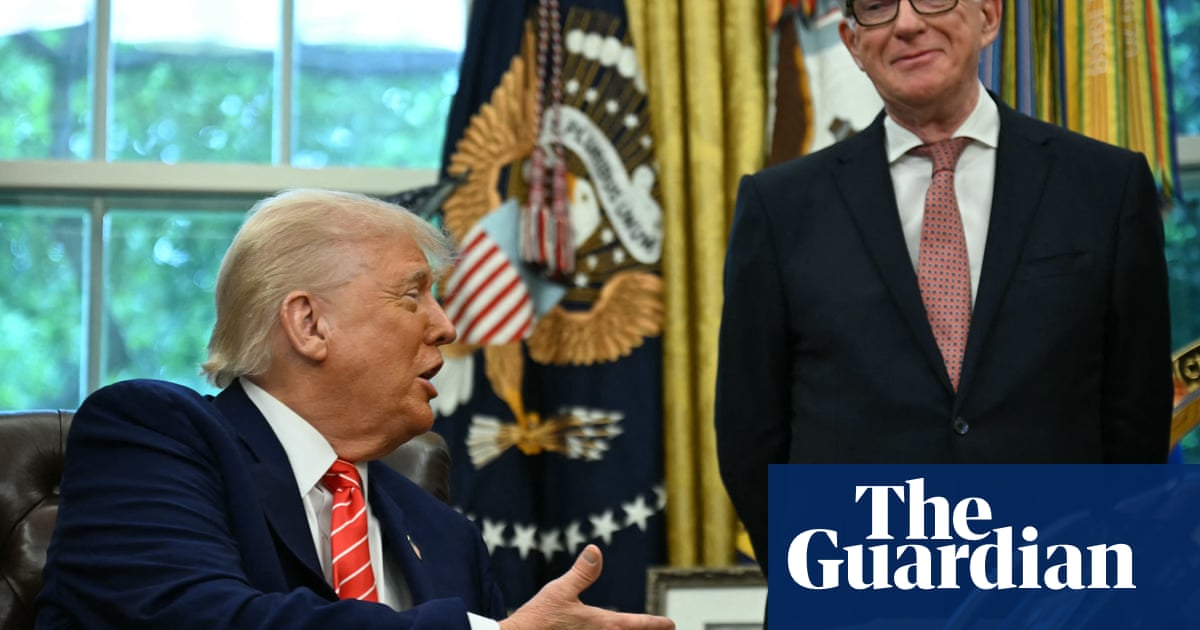There was plenty of congratulatory backslapping in the Oval Office as Donald Trump unveiled his “major” trade deal with the United Kingdom on Thursday, but many of the details of that agreement have been left to later discussions.
Trump’s rush to claim a win for his controversial tariffs policy left many grasping just what to call this: a deal, an agreement, a framework? Observers predict that the coming negotiations could take months.
“Yes, we can finish ironing out some of the details, but there’s a fantastic platform here,” Keir Starmer said by speakerphone as Trump revealed the results to journalists on Thursday.
Trade deals are usually announced only once those details are ironed out. But in this case, Trump appeared keen to get the deal out in public to make an announcement to the world: America is ready to negotiate.
Thursday’s announcement was most notable for Trump reversing course on his “extreme tariff policies”, said Gary Hufbauer, a non-resident senior fellow at the Peterson Institute for International Economics, a nonpartisan thinktank based in Washington. That could increase expectations for further deals with other countries, including Japan, South Korea, Australia, or even the European Union.
“The big payoff to Trump is the market reaction today in a more favorable political reaction in the US on his overall [tariff] policy,” said Hufbauer. “Here we’re getting this pre-announcement, which is all for political purposes, both in the UK and the US, with the hope and aspiration that the details won’t kill the deal.”
Lord Mandelson, the newly minted British ambassador, felt moved to paraphrase Winston Churchill in the Oval Office on Thursday. He called the deal “not the end … It’s the end of the beginning.”
“There is yet more we can do in reducing tariffs and trade barriers to open up our markets to each other even more than we are agreeing to do today,” he said.
Journalists in the Oval Office were more direct. “Clearly, there’s much more work still to do,” said US correspondent for Sky News. “With respect, are you overstating the reach and significance of this deal because you’re a president who needs a result at a difficult time?”
If Trump felt some of the air come out of his big announcement, he didn’t show it.
“It’s a great thing that it came together,” Trump said. “Because we have many countries want to make a deal, and many countries are very unhappy that we happened to choose this one to be honest with you.”
The UK was perhaps “our oldest ally”, he added. “I think it’s going to be something very special for UK and special for the United States.”
Trump added it had been an “honour” working with British negotiators on the deal.
US stock markets reacted enthusiastically to news of the deal. But the announcement was mainly an “agreement to negotiate”, said Hufbauer, and those negotiations could hit thorny issues such as UK restrictions on US agricultural and meat exports, as well as Trump’s recently announced tariffs on foreign film shoots.
“I think it’s unlikely Trump would want it to bust up, but the negotiations might go on for a while” if he pushes on sensitive issues, said Hufbauer.
It appears there is the political will to move forward. During the Oval Office meeting, Mandelson said that Trump had called Keir Starmer in a “very typical, 11th-hour intervention”.
And in perhaps the highest compliment that one can pay the US president, Mandelson added that Trump drove a hard bargain, demanding “even more out of this deal than any of us expected”.










